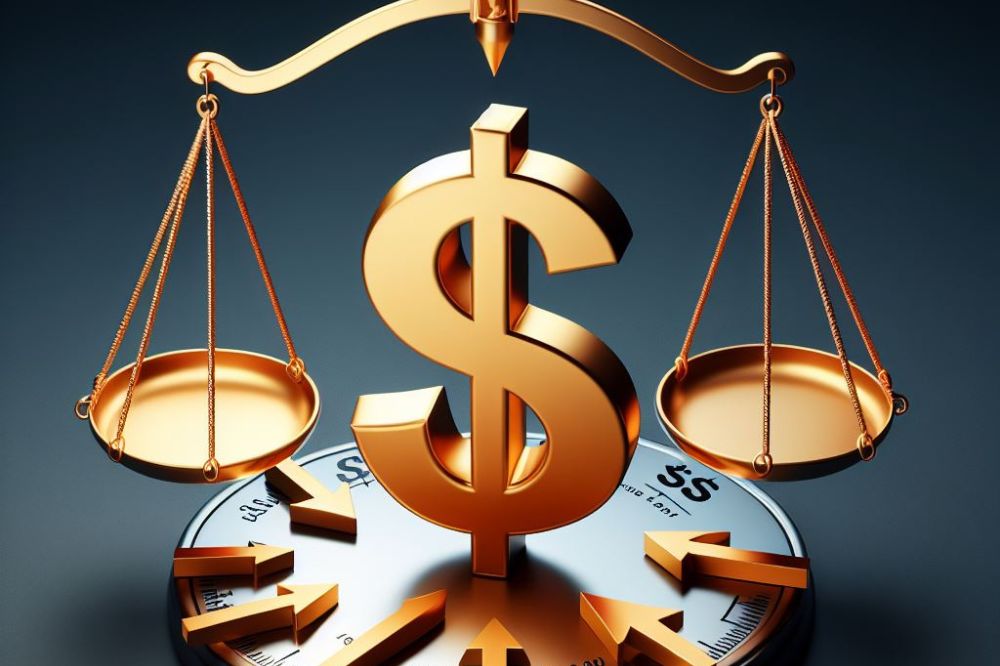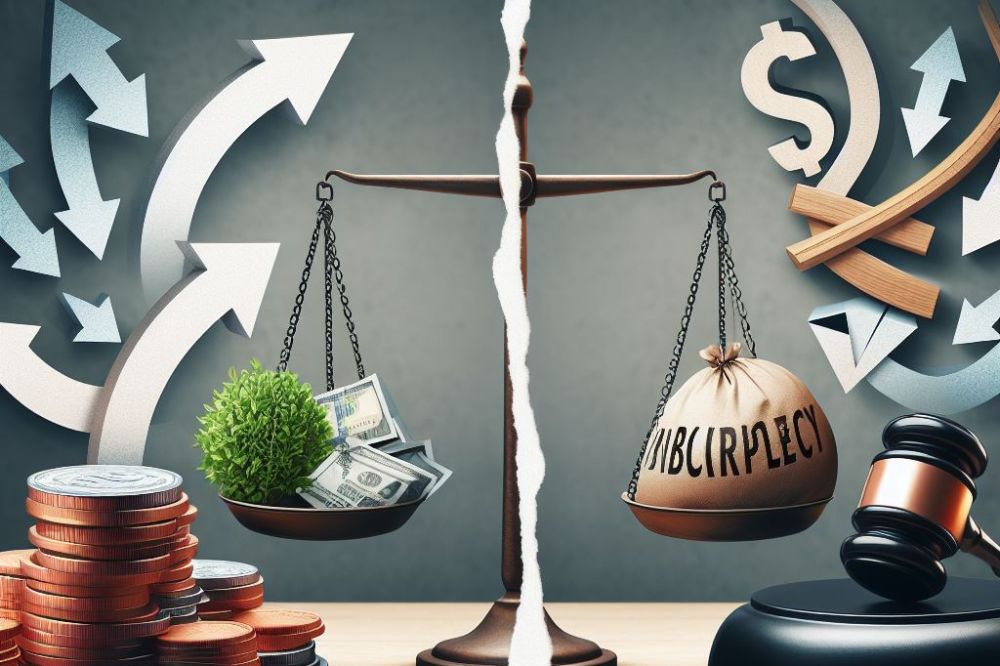- Key Takeaways
- Understanding Debt Consolidation
- Exploring Bankruptcy Options
- Debt Consolidation Benefits
- Bankruptcy Advantages and Disadvantages
- Credit Score Implications
- Making the Right Choice
- Alternative Debt Solutions
- Real-Life Scenarios
- Professional Guidance
- Summary
- Frequently Asked Questions
- Is debt consolidation a better option than filing for bankruptcy?
- How does debt consolidation benefit individuals struggling with multiple debts?
- What are the advantages and disadvantages of filing for bankruptcy?
- How does debt consolidation affect one’s credit score?
- Why is professional guidance important when choosing between debt consolidation and bankruptcy?
Did you know that in the United States, approximately 750,000 individuals file for bankruptcy each year? When faced with overwhelming debt, understanding the options of debt consolidation and bankruptcy becomes crucial. While both avenues offer solutions to manage debt, they come with distinct implications. Debt consolidation involves combining multiple debts into a single monthly payment, often at a lower interest rate. On the other hand, bankruptcy provides a legal process to eliminate or restructure debts entirely. Deciding between debt consolidation and bankruptcy requires careful consideration of one’s financial situation and long-term goals.
Key Takeaways
- Consider Debt Consolidation: If you have manageable debt and want to simplify payments, debt consolidation could be a viable option. Look into combining your debts into a single loan with lower interest rates.
- Evaluate Bankruptcy Carefully: Bankruptcy is a serious decision that can provide a fresh financial start but has long-term consequences. Assess your situation thoroughly before opting for bankruptcy.
- Weight the Pros and Cons: Debt consolidation can streamline payments and potentially lower interest rates, while bankruptcy offers debt relief but negatively impacts credit scores and future financial options.
- Monitor Your Credit Score: Understand how debt consolidation and bankruptcy can affect your credit score. Debt consolidation may have a less severe impact compared to bankruptcy.
- Seek Professional Advice: Whether considering debt consolidation or bankruptcy, consulting with a financial advisor or credit counselor can provide personalized guidance tailored to your specific circumstances.
- Explore Alternative Solutions: Besides debt consolidation and bankruptcy, research other debt relief options such as debt settlement or credit counseling to find the best fit for your financial needs.
Understanding Debt Consolidation
Basics Explained
Debt consolidation involves combining multiple debts into a single loan with lower interest rates. On the other hand, bankruptcy is a legal process where individuals or businesses declare inability to repay debts. The primary difference lies in debt consolidation aiming to simplify payments, while bankruptcy provides debt relief through court intervention.
Debt consolidation focuses on merging debts to facilitate easier repayment, whereas bankruptcy serves as a legal procedure for individuals or businesses facing overwhelming debt. The purpose of debt consolidation is to streamline payments and potentially reduce interest rates, while bankruptcy offers a fresh financial start by discharging eligible debts.

Ideal Candidates
Individuals drowning in multiple high-interest debts could benefit greatly from debt consolidation. Those suitable for bankruptcy typically face insurmountable debts with no feasible repayment options. Comparatively, individuals with manageable but challenging debts may find debt consolidation more appropriate, while those with severe financial distress might opt for bankruptcy.
- Debt Consolidation:
- Suitable for individuals with multiple high-interest debts.
- Helps those looking to simplify payments and potentially lower interest rates.
- Bankruptcy:
- Ideal for individuals facing overwhelming debts without means to repay.
- Provides a legal solution for those seeking complete or partial debt relief.
Process Overview
The process of debt consolidation starts with assessing all existing debts and obtaining a new loan to pay them off. This new loan consolidates all previous debts into one, allowing for a single monthly payment. Bankruptcy involves filing a petition in court, which triggers an automatic stay on debt collection activities. The court then reviews the individual’s financial situation before determining the type of bankruptcy best suited for their case.
- Debt Consolidation Steps:
- Assess all existing debts.
- Obtain a new loan to pay off all debts.
- Make single monthly payments towards the new consolidated loan.
- Bankruptcy Filing Process:
- File a petition in court.
- Automatic stay on debt collection activities.
- Court review of financial situation and determination of bankruptcy type.
Impact on Credit
Debt consolidation may initially impact credit scores due to the new loan application but can improve over time with consistent payments. In contrast, bankruptcy has a significant long-term negative impact on credit scores as it stays on credit reports for several years. Debt consolidation may offer quicker credit score recovery compared to the lasting effects of bankruptcy.
Exploring Bankruptcy Options
Chapter 7 Overview
Key Features
Debt consolidation programs focus on combining multiple debts into a single, manageable monthly payment. These programs often negotiate lower interest rates with creditors to help individuals pay off debts faster. On the other hand, bankruptcy filings involve a legal process where individuals can eliminate certain types of debts through court proceedings.
When comparing debt consolidation and bankruptcy, it’s crucial to understand that debt consolidation aims to restructure existing debts, while bankruptcy offers a more drastic solution by potentially discharging debts entirely.
Best Fit Scenario
Debt consolidation is ideal for individuals with manageable debt levels who seek a structured repayment plan without damaging their credit score. On the contrary, bankruptcy might be suitable for those facing overwhelming debt burdens or unable to repay their debts even after restructuring.
For example, someone with moderate credit card debt may benefit from debt consolidation, whereas an individual facing foreclosure due to significant medical bills might find relief through bankruptcy.
Chapter 13 Insights
Core Principles
Debt consolidation operates on the principle of combining debts into one payment, often at a reduced interest rate. In contrast, bankruptcy adheres to the core principle of providing individuals with a legal mechanism to eliminate or restructure debts under court supervision.
Comparing the core principles of debt consolidation and bankruptcy reveals that both aim to help individuals regain financial stability but through different approaches.
Target Audience
The target audience for debt consolidation services typically includes individuals with moderate levels of unsecured debt, such as credit cards or personal loans. On the other hand, bankruptcy lawyers cater to a demographic facing severe financial distress, including those dealing with issues like foreclosure or wage garnishment.
The difference in target audiences for debt consolidation and bankruptcy highlights the varying needs and financial situations that each option addresses effectively.
Debt Consolidation Benefits
Pros Highlighted
Debt consolidation offers a streamlined approach to managing multiple debts, combining them into a single payment. This simplifies financial responsibilities and helps in avoiding missed payments. By reducing interest rates and monthly payments, debt consolidation can make repayment more manageable. It may improve credit scores by showing consistent payments.
On the other hand, bankruptcy provides a legal method for individuals to eliminate or restructure their debts under court supervision. It offers immediate relief from creditors’ collection efforts, including lawsuits and wage garnishments. Bankruptcy can also halt foreclosure proceedings, giving individuals a chance to keep their homes.
When comparing the pros of debt consolidation and bankruptcy, debt consolidation preserves credit scores by keeping accounts open and showing positive payment history. It also allows individuals to repay debts in full without affecting credit as severely as bankruptcy does. In contrast, bankruptcy offers a fresh financial start by discharging most or all debts quickly.

Cons Considered
One potential drawback of debt consolidation is that it may require collateral, such as home equity, to secure a lower interest rate. This puts assets at risk if individuals are unable to make payments on the consolidated loan. Moreover, some debt consolidation programs charge fees or higher interest rates, increasing the overall cost of repaying debts.
Conversely, filing for bankruptcy can have long-lasting negative effects on credit scores, making it challenging to obtain new credit or loans in the future. It also involves court fees and attorney costs that can be expensive for individuals already facing financial difficulties. Bankruptcy stays on credit reports for several years.
When considering the cons of debt consolidation versus bankruptcy options, debt consolidation may not provide as much debt relief as bankruptcy does since it focuses on repayment rather than elimination. Furthermore, missed payments during a debt consolidation program could lead to further financial distress and potential default.
Bankruptcy Advantages and Disadvantages
Chapter 7 Pros and Cons
Chapter 7 bankruptcy offers immediate debt relief by liquidating assets to pay off creditors quickly. It provides a fresh start for individuals overwhelmed by debts.
However, Chapter 7 bankruptcy may require selling valuable assets, including homes or cars. It can also negatively impact credit scores significantly.
In comparing the pros and cons of Chapter 7 bankruptcy, the key advantage is the quick discharge of debts. On the flip side, the major disadvantage is potential loss of assets.
Chapter 13 Pros and Cons
Chapter 13 bankruptcy allows individuals to keep their valuable assets while restructuring their debts through a repayment plan. This option is suitable for those with a regular income.
On the downside, Chapter 13 bankruptcy involves a long-term commitment to repay debts over three to five years. It requires strict adherence to the court-approved repayment plan.
When weighing the pros and cons of Chapter 13 bankruptcy, the main benefit lies in asset retention during debt restructuring. Conversely, the limitation is the extended duration of debt repayment.
Credit Score Implications
Debt Consolidation Effects
Debt consolidation simplifies debt management by combining multiple debts into a single payment, making it easier to track. This approach often results in lower monthly payments, providing relief to individuals struggling with debt. By consolidating debts, individuals can potentially reduce their overall interest rates, saving money in the long run.
Choosing debt consolidation as a solution can have both positive and negative consequences. On the positive side, it can help individuals avoid defaulting on loans and damaging their credit scores further. However, on the flip side, it may extend the repayment period, resulting in paying more interest over time.
Bankruptcy Repercussions
Filing for bankruptcy has severe repercussions that can impact an individual’s financial life for years to come. One of the most significant effects is the immediate hit to one’s credit score, which can take years to recover from. This can make it challenging to secure loans or credit cards in the future.
The long-term effects of bankruptcy on financial stability are substantial. It can make it difficult to qualify for favorable interest rates on loans or mortgages. Bankruptcy stays on an individual’s credit report for up to ten years, affecting their ability to access credit at reasonable terms.
Bankruptcy comes with several negative outcomes that individuals should consider before proceeding with this option. These include potential loss of assets, such as property or vehicles, and limitations on future financial opportunities. It also carries a social stigma that may affect personal relationships and professional opportunities.
Making the Right Choice
When considering debt consolidation, individuals should assess their total debt amount, interest rates, and repayment capabilities. Understanding these factors helps in determining if consolidating debts into a single payment is feasible. Analyzing the impact on credit scores post-consolidation is crucial for informed decision-making.
Bankruptcy decisions hinge on factors such as the type of debt, income stability, and asset ownership. Evaluating the long-term consequences of bankruptcy on one’s financial health is essential. Considering the impact on credit scores after filing for bankruptcy is a critical aspect to weigh.
Comparing debt consolidation and bankruptcy, key factors include the level of debt, current financial situation, and future goals. Debt consolidation offers a structured repayment plan without severe credit score implications. In contrast, bankruptcy provides a fresh start but with lasting effects on credit scores.
Financial experts suggest debt consolidation when individuals have multiple high-interest debts and struggle to manage payments. Consolidating debts can simplify finances and potentially lower interest rates, aiding in faster debt repayment. Maintaining a good credit score post-consolidation is vital for future financial opportunities.
For those considering bankruptcy, financial advisors recommend exploring all alternative options before proceeding with bankruptcy filings. Bankruptcy should be a last resort due to its significant impact on credit scores and long-term financial standing. Seeking professional guidance is crucial to navigate the complexities of bankruptcy proceedings.
Experts often advise choosing debt consolidation over bankruptcy if individuals have the means to repay debts gradually. Debt consolidation allows for maintaining assets and avoiding the severe credit score repercussions of bankruptcy. However, if debts are overwhelming and unmanageable, bankruptcy might offer a necessary solution for debt relief.
Alternative Debt Solutions
Other Options
When considering alternative solutions to debt consolidation, individuals can explore options like credit counseling. This involves working with a financial counselor to create a budget and repayment plan. Another option is debt settlement, where a negotiation is made with creditors to settle debts for less than what is owed.
Individuals can also look into balance transfer credit cards, which allow transferring high-interest balances to a card with a lower interest rate. Some may opt for personal loans as an alternative to debt consolidation or bankruptcy, consolidating multiple debts into one loan with a fixed monthly payment.
When to Consider
In determining when to consider debt consolidation, it is essential for individuals facing challenges in managing multiple debts or seeking lower interest rates on their existing debts. Debt consolidation can simplify payments and potentially reduce overall interest costs.
On the other hand, serious consideration of bankruptcy may be warranted when individuals are overwhelmed by debt that cannot be managed through other means. Bankruptcy provides legal protection from creditors and can lead to the discharge of certain debts, offering a fresh start financially.
Guidance on when to consider debt consolidation versus bankruptcy depends on the individual’s financial situation. If someone has manageable debt levels but struggles with payments, debt consolidation could be beneficial. In contrast, bankruptcy may be necessary for those facing insurmountable debt and seeking a more drastic solution.
Real-Life Scenarios
Success Stories
Debt consolidation can be a beacon of hope for those drowning in debt. One success story involves Sarah, who combined her debts into a single monthly payment, making it easier to manage her finances. With dedication and discipline, she paid off her debts within three years. Another inspiring tale is that of John, who opted for bankruptcy after facing overwhelming financial challenges. Following the process diligently, he successfully discharged his debts and started afresh financially.
Cautionary Tales
Debt consolidation comes with its own set of risks if not approached carefully. Some common pitfalls to avoid include taking on new loans without proper planning and falling prey to high-interest rates. On the other hand, bankruptcy should be a last resort due to its long-term impact on credit scores and financial standing. An illustrative cautionary tale involves Mia, who hastily filed for bankruptcy without exploring other options first. This decision led to prolonged financial struggles and limited access to credit in the future.
Professional Guidance
Consulting Experts
Financial experts play a crucial role in guiding individuals on the importance of seeking their advice before deciding between debt consolidation and bankruptcy. They can provide insightful information on the best course of action based on individual financial situations. Seeking legal advice from bankruptcy attorneys is highly recommended to understand the legal implications and consequences associated with filing for bankruptcy. Their expertise can help individuals navigate the complex legal processes involved in bankruptcy proceedings effectively. Expert consultations are invaluable in helping individuals make well-informed decisions about managing their debts wisely.

Finding Help
When considering debt consolidation, it is essential to find reputable services that offer reliable solutions to consolidate debts effectively. Resources such as consumer protection agencies or financial counseling organizations can assist individuals in identifying trustworthy debt consolidation services. Similarly, when contemplating bankruptcy as a debt relief option, finding competent bankruptcy lawyers is crucial. These professionals can provide legal representation and guidance throughout the bankruptcy process, ensuring that all legal requirements are met accurately. Individuals can seek assistance from various sources to navigate either the debt consolidation or bankruptcy processes smoothly.
Summary
You’ve explored the differences between debt consolidation and bankruptcy, weighing the benefits and drawbacks of each. Understanding how these options can impact your financial health is crucial. Debt consolidation offers a way to manage multiple debts efficiently, potentially improving your credit score over time. On the other hand, bankruptcy provides a fresh start but comes with long-term consequences. Making the right choice depends on your unique circumstances and goals.
Consider seeking professional guidance to navigate these complex decisions effectively. Remember, there are alternative debt solutions available, so explore all options before committing. Your financial well-being is essential, so take the time to assess your situation carefully and choose the path that aligns best with your long-term objectives.
Frequently Asked Questions
Is debt consolidation a better option than filing for bankruptcy?
Debt consolidation is often preferred as it allows you to combine multiple debts into one, potentially lowering interest rates. Bankruptcy should be considered as a last resort due to its long-term impact on credit and financial status.
How does debt consolidation benefit individuals struggling with multiple debts?
Debt consolidation simplifies finances by combining debts into a single payment with potentially lower interest rates. It can also help avoid defaulting on payments and protect credit scores by ensuring timely repayments.
What are the advantages and disadvantages of filing for bankruptcy?
Bankruptcy provides immediate relief from overwhelming debt and stops creditor harassment. However, it severely impacts credit scores, limits access to credit, and may require liquidation of assets. It’s crucial to weigh these consequences before opting for bankruptcy.
How does debt consolidation affect one’s credit score?
Debt consolidation can positively impact credit scores by streamlining payments and reducing the risk of missed or late payments. By consolidating debts, individuals can improve their credit utilization ratio, which is a key factor in determining credit scores.
Why is professional guidance important when choosing between debt consolidation and bankruptcy?
Professional guidance ensures individuals fully understand their options, implications, and legal requirements associated with debt management strategies. Financial advisors or counselors can provide personalized advice based on individual circumstances to make an informed decision that aligns with long-term financial goals.




